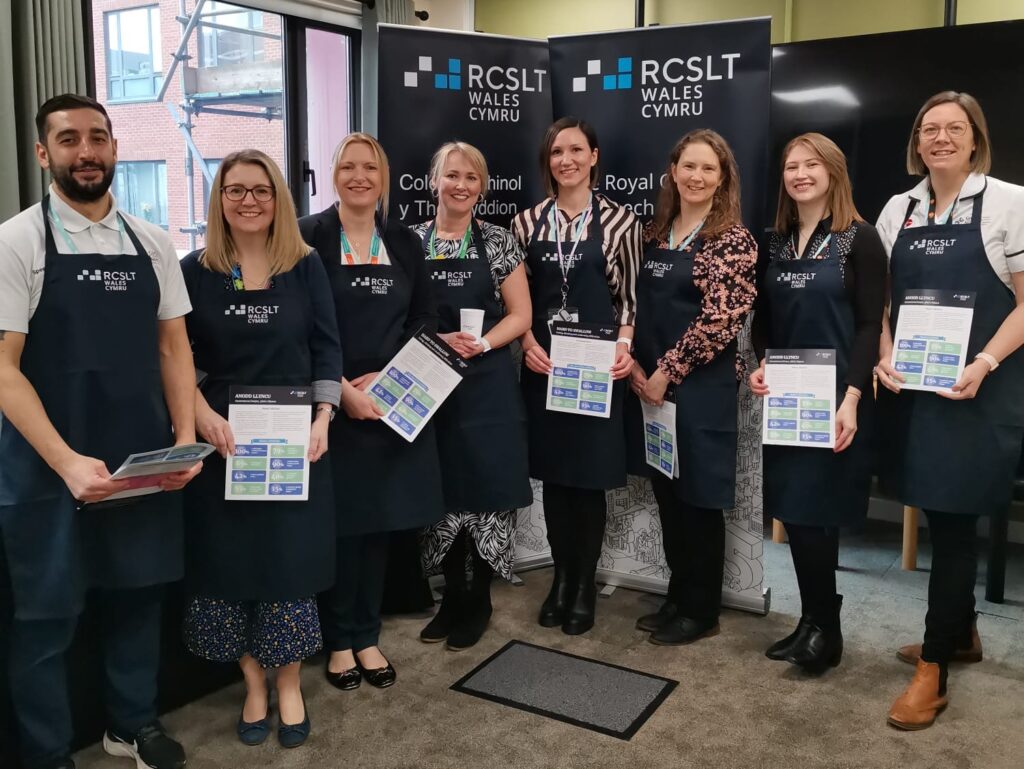Senedd event shines spotlight on people with eating, drinking, and swallowing difficulties on Swallowing Awareness Day – 13 March 2024

Eating, drinking, and swallowing are often taken for granted, but many people have difficulties consuming food and drink. Known as ‘dysphagia’, these difficulties can affect a person’s quality of life and lead to serious health complications. Yesterday (13 March 2024), on Swallowing Awareness Day, the Royal College of Speech and Language Therapists hosted an event in the Senedd for Senedd Members to learn more about the issue.
Taking place during NHS Nutrition and Hydration Week, the event enabled Senedd Members to taste and experience a range of modified dishes available to people with eating, drinking and swallowing needs and to speak to speech and language therapists about the vital work they do in assessing and supporting people.
The dysphagia-friendly food was provided by Wiltshire Farm Foods, prepared in the Senedd, and included dishes such as extra tender chicken in gravy, bakewell sponge, and vegetable curry.
Ahead of Swallowing Awareness Day (#SwallowAware2024), four MSs (Llyr Gruffydd, Huw Irranca Davies, Jane Dodds, and Russell George) also visited speech and language therapists in their local hospitals to learn more about the impact of eating, drinking, and swallowing difficulties, and the role of the profession in supporting people.
Eating, drinking and swallowing difficulties can affect babies, children and adults and are much more prevalent* than you might think:
- up to 100% of people with motor neurone disease (MND)
- up to 99% of children with cerebral palsy
- up to 90% of people in intensive care units
- 85% of people with dementia
- 79% of people at the end of their lives
- 55% of people with head and neck cancer
- 50% of people with Parkinson’s disease
- 42% of people who have had a stroke
- up to 40% of infants born prematurely
- 31% of people with multiple sclerosis
- 8-17% of people with a learning disability
Speech and language therapists play a key role in the identification and management of dysphagia. They:
- help improve swallowing through exercises, techniques, and positioning
- promote patient safety through modifying the texture of food and fluids, reducing the risk of malnutrition, dehydration and choking
- promote quality of life, considering an individual’s and their families’ preferences and beliefs, and helping them adjust to living with swallowing difficulties
- work with other healthcare staff, particularly dietitians, to optimise nutrition and hydration
- educate and train others in identifying, assessing, and managing dysphagia.
As well as improving quality of life, mental and physical wellbeing, speech and language therapy can produce economic benefits and savings for the wider health economy, including through reducing avoidable hospital admissions.
Pippa Cotterill, Head of Wales Office at the Royal College of Speech and Language Therapists said: “We were thrilled to see so many Senedd Members attend our Swallowing Awareness Day event. Hearing the real-life accounts of speech and language therapists is always inspiring but it’s also a stark reminder of the sheer volume of eating, drinking, and swallowing challenges their patients face.
“I’d also like to thank Wiltshire Farm Foods for supplying modified foods so members of the Senedd could understand what many patients experience every day, and I call upon all restaurants and venues across Wales to consider people’s eating, drinking, and swallowing challenges to try and accommodate accordingly.”





